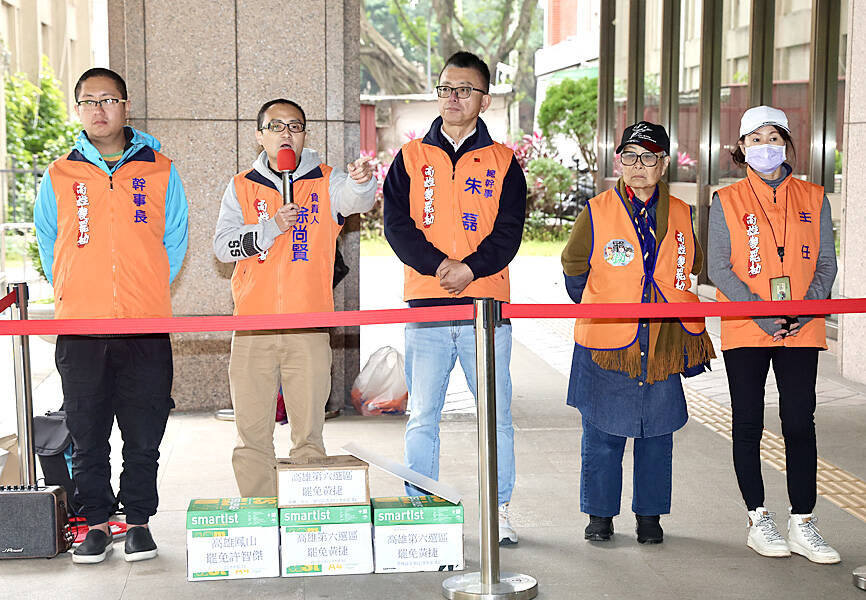Hsu Shang-hsien (徐尚賢), the leader of a recall vote campaign organization targeting two Democratic Progressive Party (DPP) lawmakers in Kaohsiung, has been detained following questioning over alleged forgery and contraventions of the Personal Data Protection Act (個人資料保護法).
The Kaohsiung District Court on Saturday approved local prosecutors’ request to detain Hsu and hold him incommunicado for two months. The court cited concerns that he could tamper with evidence or collude with other people involved in the case.
According to court documents released yesterday, Hsu admitted that many of the signatures on his organization’s recall petition documents were not provided by actual supporters, but were written by himself or campaign volunteers.

Photo: CNA
Although Hsu denied illegally collecting and using personal data, the court said digital evidence on two confiscated phones and witness testimony pointed to “suspected serious illegality.”
The Kaohsiung District Prosecutors’ Office said that Hsu deleted files and chat records related to the recall vote campaign and advised others, including a man named Chu Lei (朱磊) and a woman surnamed Huang (黃), on how to respond to judicial inquiries.
Huang was released without bail after being questioned on Friday and Chu was released on bail of NT$150,000 early on Saturday, prosecutors said.
The court said that the facts remain unclear and that the risk of collusion with others who have not yet been questioned justified Hsu’s pretrial detention.
Hsu ran the campaign organization “Double Strike Petition Headquarters,” which coordinated signature collections for campaigns against DPP lawmakers Hsu Chih-chieh (許智傑) and Huang Jie (黃捷), both of whom represent Kaohsiung electoral districts in the legislature.
The case is one of several ongoing investigations into alleged illegality in recall vote campaigns targeting DPP lawmakers, which have led opposition politicians to accuse the ruling party of using the judiciary to “persecute” its political opponents.
The Chinese Nationalist Party (KMT) protested outside the Taipei District Prosecutors’ Office last week and is urging Taiwanese to assemble in front of the Presidential Office Building on Saturday.
The DPP has denied the allegation and accused the KMT of threatening Taiwan’s social stability and democracy.
Last week, separate investigations by Taipei and New Taipei City prosecutors resulted in raids and the arrests of activists who had allegedly forged signatures and contravened data protection laws in their recall campaigns against DPP lawmakers.
According to the Public Officials Election and Recall Act (公職人員選舉罷免法), a public vote could be triggered if campaigners are able to collect signatures from 1 percent of district voters in the first round and 10 percent in the second.

The combined effect of the monsoon, the outer rim of Typhoon Fengshen and a low-pressure system is expected to bring significant rainfall this week to various parts of the nation, the Central Weather Administration (CWA) said. The heaviest rain is expected to occur today and tomorrow, with torrential rain expected in Keelung’s north coast, Yilan and the mountainous regions of Taipei and New Taipei City, the CWA said. Rivers could rise rapidly, and residents should stay away from riverbanks and avoid going to the mountains or engaging in water activities, it said. Scattered showers are expected today in central and

COOPERATION: Taiwan is aligning closely with US strategic objectives on various matters, including China’s rare earths restrictions, the Ministry of Foreign Affairs said Taiwan could deal with China’s tightened export controls on rare earth metals by turning to “urban mining,” a researcher said yesterday. Rare earth metals, which are used in semiconductors and other electronic components, could be recovered from industrial or electronic waste to reduce reliance on imports, National Cheng Kung University Department of Resources Engineering professor Lee Cheng-han (李政翰) said. Despite their name, rare earth elements are not actually rare — their abundance in the Earth’s crust is relatively high, but they are dispersed, making extraction and refining energy-intensive and environmentally damaging, he said, adding that many countries have opted to

FORCED LABOR: A US court listed three Taiwanese and nine firms based in Taiwan in its indictment, with eight of the companies registered at the same address Nine companies registered in Taiwan, as well as three Taiwanese, on Tuesday were named by the US Department of the Treasury’s Office of Foreign Assets Control (OFAC) as Specially Designated Nationals (SDNs) as a result of a US federal court indictment. The indictment unsealed at the federal court in Brooklyn, New York, said that Chen Zhi (陳志), a dual Cambodian-British national, is being indicted for fraud conspiracy, money laundering and overseeing Prince Holding Group’s forced-labor scam camps in Cambodia. At its peak, the company allegedly made US$30 million per day, court documents showed. The US government has seized Chen’s noncustodial wallet, which contains

SUPPLY CHAIN: Taiwan’s advantages in the drone industry include rapid production capacity that is independent of Chinese-made parts, the economic ministry said The Executive Yuan yesterday approved plans to invest NT$44.2 billion (US$1.44 billion) into domestic production of uncrewed aerial vehicles over the next six years, bringing Taiwan’s output value to more than NT$40 billion by 2030 and making the nation Asia’s democratic hub for the drone supply chain. The proposed budget has NT$33.8 billion in new allocations and NT$10.43 billion in existing funds, the Ministry of Economic Affairs said. Under the new development program, the public sector would purchase nearly 100,000 drones, of which 50,898 would be for civil and government use, while 48,750 would be for national defense, it said. The Ministry of